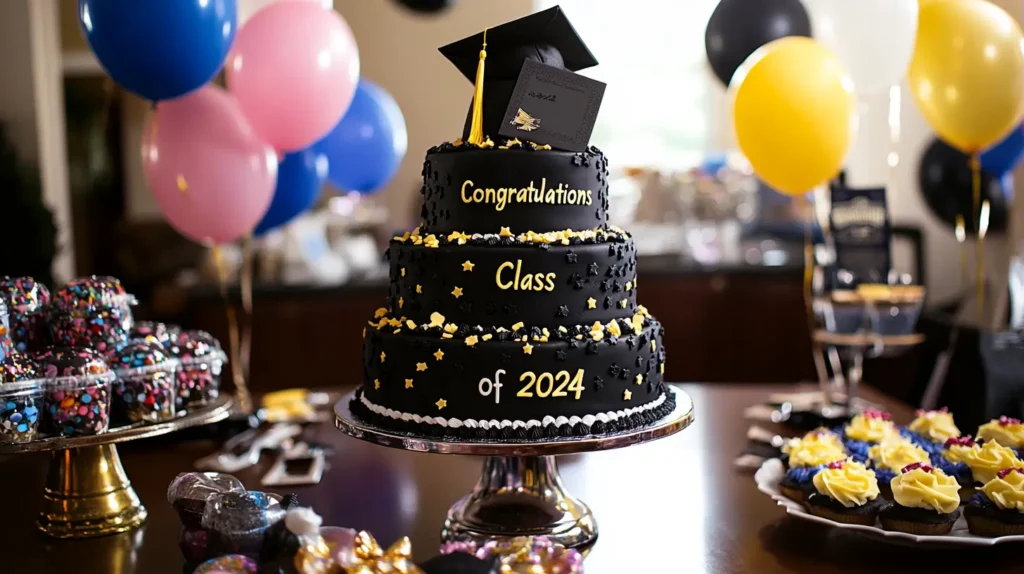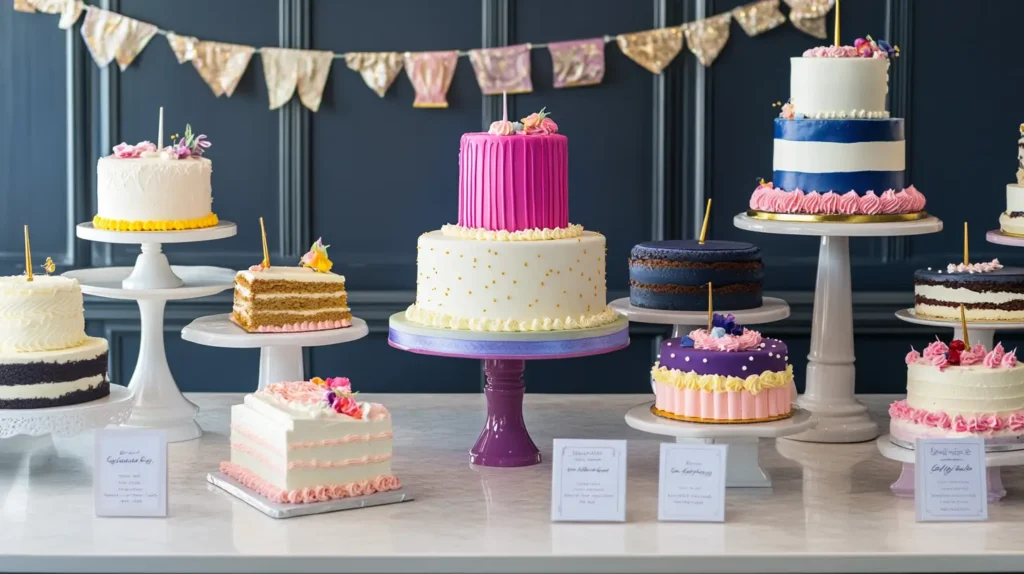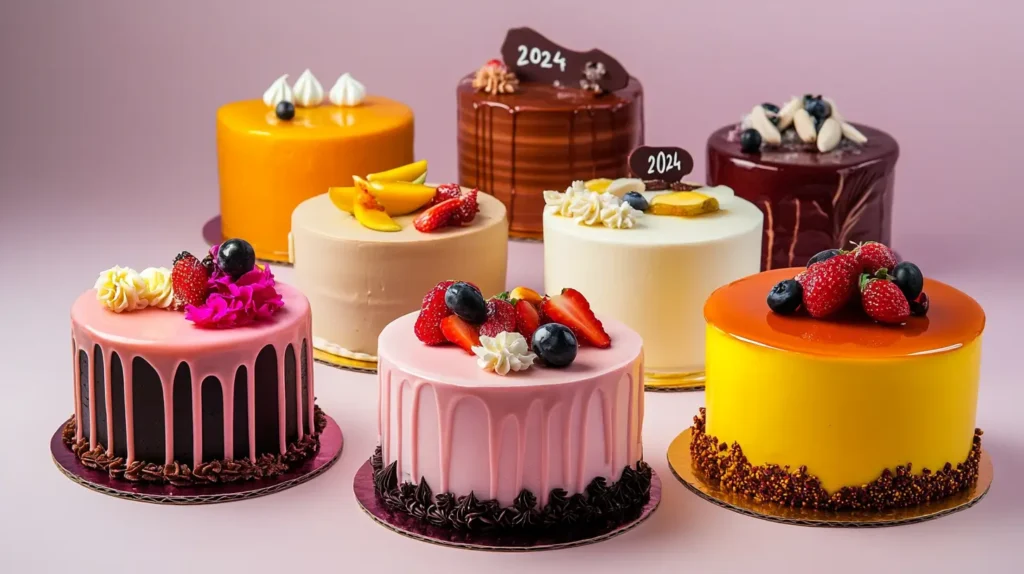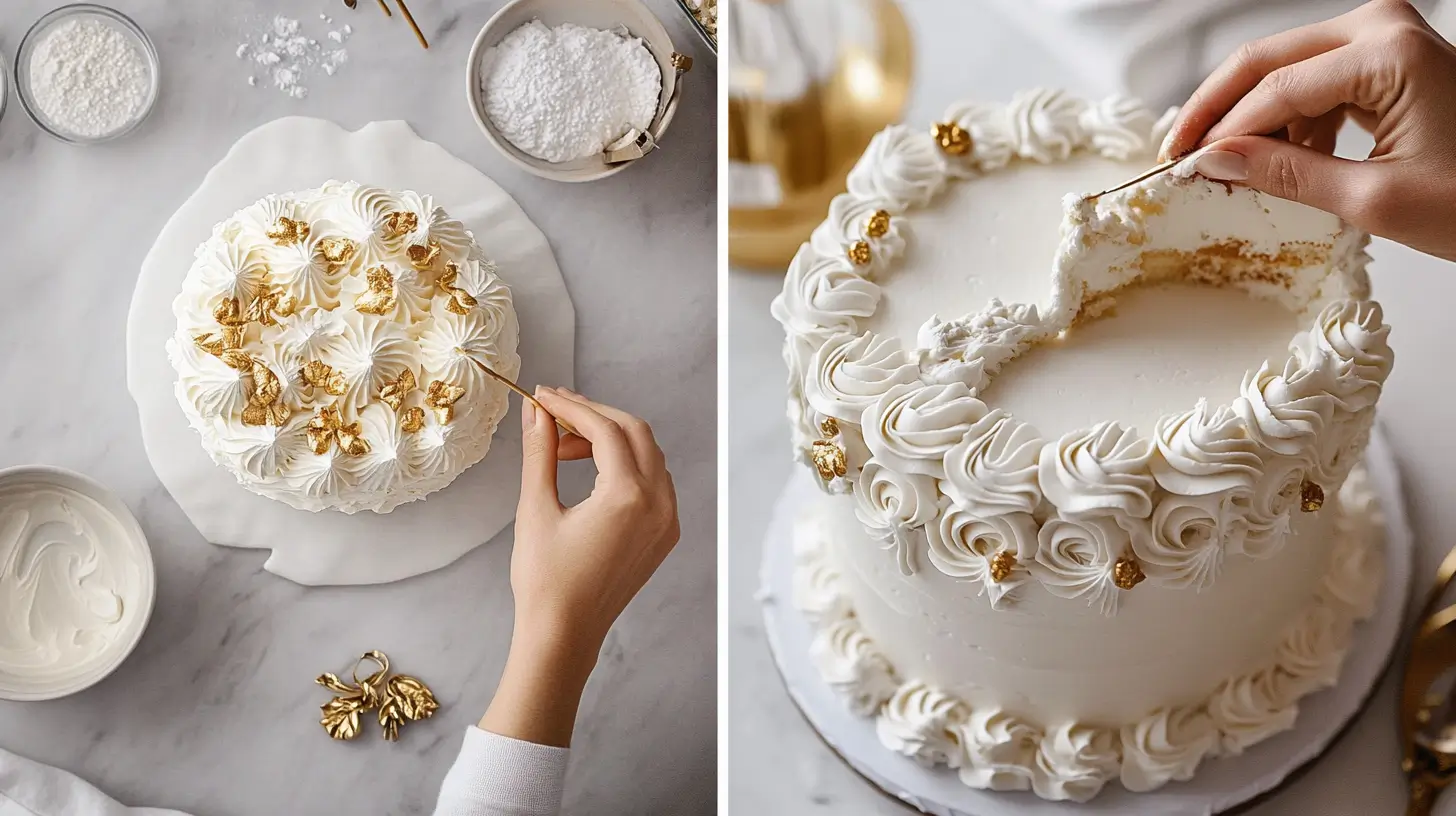Graduation is a milestone worth celebrating, and nothing marks the occasion better than a stunning, personalized graduation cake. Whether you’re baking at home or ordering from a professional bakery, graduation cakes are much more than just desserts they’re the centerpiece of the celebration, symbolizing achievement and the journey ahead.
This comprehensive guide will teach you how to craft or select the perfect graduation cake, covering everything from the latest trends to step-by-step recipes and decorating techniques. Whether you’re a novice baker or a seasoned pro, these tips and insights will help you create a cake that’s both delicious and unforgettable.
Table of contents
- Why Graduation Cakes Matter
- The Evolution of Graduation Cakes
- How to Choose the Right Graduation Cake
- Step-by-Step Guide: Baking a Graduation Cake from Scratch
- Making the Buttercream Frosting
- Assembling and Decorating the Graduation Cake
- Advanced Decorating Ideas for Graduation Cakes
- Trending Graduation Cake Flavors for 2024
- Tips for Making a Memorable Graduation Cake
- Avoiding Common Mistakes
- FAQ
- Conclusion
Why Graduation Cakes Matter


Graduation cakes play a special role in marking a major life milestone. They’re not just sweet treats; they’re symbols of accomplishment, perseverance, and future possibilities.
Imagine this: A graduate walks into their party, and their eyes light up when they see a cake that reflects their achievements and aspirations. The perfect cake becomes a conversation piece, a photo backdrop, and, most importantly, a cherished memory.
The Evolution of Graduation Cakes
Then: A Simple Tradition
In the past, graduation cakes were often simple sheet cakes topped with white frosting, a piped congratulatory message, and perhaps a plastic topper shaped like a mortarboard. While these cakes were undeniably delicious, they often lacked creativity and personalization, making them feel a bit generic. They served their purpose, but as celebrations became more personalized and unique, so too did the cakes.
Today, graduation cakes have evolved into show-stopping centerpieces that reflect the graduate’s personality, achievements, and journey. From custom designs that include elements of the graduate’s field of study to fondant sculptures that celebrate their interests and future plans, the possibilities for creating a one-of-a-kind graduation cake are endless. The shift from simple, traditional cakes to more innovative, customized designs allows for a cake that is not only delicious but also meaningful, elevating the entire celebration into something truly special.
Now: A Canvas for Creativity
Today, graduation cakes have transformed into true works of art, going far beyond the simple sheet cakes of the past. These cakes range from elegant single-tier designs to elaborate multi-tiered masterpieces, each one uniquely reflecting the graduate’s personality, academic journey, and future aspirations. Whether it’s incorporating school colors, favorite hobbies, or symbols of their chosen career path, modern graduation cakes are designed to be as meaningful as they are beautiful.
These cakes don’t just impress with their stunning aesthetics; they also tell a story. Each element, from the choice of flavor to the intricate designs, represents a chapter in the graduate’s life, celebrating their hard work, perseverance, and the bright future ahead. Whether adorned with fondant accents, custom decorations, or personalized messages, a modern graduation cake is much more than a dessert it’s a symbol of accomplishment, pride, and new beginnings, making it a memorable centerpiece for any graduation celebration.
How to Choose the Right Graduation Cake


1. Consider the Graduate’s Interests
Is the graduate passionate about science, sports, or music? Let these interests be the driving force behind the cake design to make it even more personalized and meaningful. Customizing the graduation cake to reflect the graduate’s passions adds a special touch that highlights their individuality and celebrates their unique achievements.
For a science lover, consider incorporating elements like a molecular structure design, a fondant beaker, or a periodic table motif. These creative touches will not only showcase their love for science but also serve as a conversation starter at the celebration.
For sports enthusiasts, the cake could be designed with their favorite team colors, a miniature fondant jersey, or a cake shaped like a sports ball, such as a football, basketball, or soccer ball. Adding trophies, medals, or even a graduation cap incorporated into the design of a sports field can highlight their athletic achievements.
If the graduate is passionate about music, consider a design featuring musical notes, instruments, or sheet music. You could also use edible decorations to create a cake that looks like their favorite instrument, whether it’s a guitar, piano, or violin. This personalized touch will make the cake even more meaningful and reflective of their journey.
By tailoring the cake to the graduate’s passions, you not only make the dessert more fun but also create a memorable symbol of their hard work and dedication in their chosen field. Let their interests inspire the cake design, making the celebration that much more special. For example:
- A graduate pursuing a career in medicine might appreciate a cake featuring edible stethoscopes or pill bottles.
- A music lover might adore a cake adorned with edible musical notes or a miniature fondant guitar.
2. Incorporate School Pride
Show off school spirit by incorporating elements like:
- School colors in the frosting or fondant.
- A replica of the school logo made with edible paint or sugar decorations.
- The graduate’s academic major or field of study.
3. Balance Flavor and Design
The appearance of the cake is important, but flavor should never be an afterthought. Some popular flavor combinations include:
- Chocolate espresso: A rich, bold choice perfect for coffee lovers.
- Vanilla bean with raspberry filling: A classic combination with a fruity twist.
- Salted caramel with chocolate ganache: A decadent option for those with a sweet tooth.
Step-by-Step Guide: Baking a Graduation Cake from Scratch
Creating a homemade graduation cake is a heartfelt way to celebrate this significant milestone. Not only does it add a personal touch to the celebration, but it also allows you to create a dessert that is as unique as the graduate themselves. Whether you’re making a cake for a high school graduation, college graduation, or any other academic achievement, a homemade cake is the perfect way to mark the occasion. In this guide, we’ll provide a detailed, step-by-step recipe for a classic vanilla sponge cake with smooth, creamy buttercream frosting. Additionally, we’ll offer expert tips on how to customize the cake to reflect the graduate’s personality, interests, and accomplishments, making it a true centerpiece of the celebration.
This classic vanilla sponge cake recipe is not only delicious but also versatile, allowing you to incorporate your own creative elements. Whether you want to match the cake to the graduate’s school colors, add a fondant topper representing their future aspirations, or create a multi-tier cake for an extra wow factor, this recipe is the perfect base. By following these easy-to-understand instructions and customization tips, you can ensure that your homemade graduation cake will be both visually stunning and incredibly delicious, making the celebration even more memorable. So, let’s dive in and make this graduation celebration a little sweeter with a homemade cake that everyone will love.
Ingredients
For the Cake:
- 2½ cups (315g) all-purpose flour
- 2½ teaspoons baking powder
- ½ teaspoon salt
- 1 cup (226g) unsalted butter, softened
- 2 cups (400g) granulated sugar
- 4 large eggs, at room temperature
- 1 tablespoon pure vanilla extract
- 1 cup (240ml) whole milk
For the Buttercream Frosting:
- 1½ cups (340g) unsalted butter, softened
- 6 cups (750g) powdered sugar, sifted
- 2 teaspoons pure vanilla extract
- 3–4 tablespoons heavy cream
- Gel food coloring (optional)
Equipment
- 2 9-inch round cake pans
- Mixing bowls
- Electric mixer or stand mixer
- Offset spatula
- Piping bags and tips
- Turntable (optional but helpful for decorating)
Instructions
1: Preheat the Oven and Prepare the Pans
- Preheat your oven to 350°F (175°C).
- Grease the cake pans and line them with parchment paper for easy removal.
2: Mix the Dry Ingredients
- In a medium bowl, whisk together the flour, baking powder, and salt. Set aside.
3: Cream the Butter and Sugar
- In a large mixing bowl, beat the butter and sugar together using an electric mixer on medium speed until light and fluffy, about 3-4 minutes.
4: Add the Eggs and Vanilla
- Add the eggs one at a time, beating well after each addition.
- Mix in the vanilla extract.
5: Alternate Wet and Dry Ingredients
- Reduce the mixer speed to low. Add the dry ingredients in three additions, alternating with the milk in two additions (beginning and ending with the dry ingredients). Mix just until combined—avoid overmixing.
6: Bake the Cake Layers
- Divide the batter evenly between the prepared pans.
- Bake for 30-35 minutes, or until a toothpick inserted into the center comes out clean.
- Let the cakes cool in the pans for 10 minutes, then transfer them to a wire rack to cool completely.
Making the Buttercream Frosting
- Beat the softened butter on medium speed until creamy, about 2 minutes.
- Gradually add the powdered sugar, one cup at a time, beating on low speed.
- Mix in the vanilla extract and 2 tablespoons of heavy cream. Add more cream, one tablespoon at a time, until the frosting reaches your desired consistency.
- If desired, tint the frosting with gel food coloring to match school colors or party themes.
Assembling and Decorating the Graduation Cake
- Level the Cake Layers: Use a serrated knife to trim the tops of the cakes to make them flat.
- Apply the Crumb Coat: Spread a thin layer of frosting over the entire cake to trap crumbs. Chill the cake for 30 minutes.
- Frost the Cake: Apply a thicker layer of frosting, smoothing it with an offset spatula.
- Add Decorations:
- Use a piping bag to add borders, swirls, or messages.
- Create edible toppers like graduation caps or diplomas using fondant.
- Incorporate edible glitter or metallic accents for a celebratory touch.
Advanced Decorating Ideas for Graduation Cakes
1. Fondant Graduation Cap
Roll out black fondant and shape it into a square for the cap. Add a small circle underneath and attach an edible tassel using gold fondant or candy rope.
2. Edible Diplomas
Use white fondant to roll small “scrolls,” and tie them with red licorice or fondant strips.
3. School Logo or Mascot
Use edible paints or printable sugar sheets to replicate the school’s logo.
4. Personalized Details
Incorporating edible images of the graduate or their achievements is a fantastic way to personalize the graduation cake and make it truly one-of-a-kind. With the help of photo-printing technology, local bakeries can print high-quality edible images onto fondant or icing sheets, allowing you to add a photo of the graduate or images representing their accomplishments directly onto the cake.
For example, you could use a high-resolution image of the graduate in their cap and gown, showcasing their proud moment, or you could incorporate pictures of significant achievements like a team photo for an athlete, a science fair ribbon for a budding scientist, or sheet music for a music enthusiast. These edible images not only add a personal touch but also serve as a wonderful way to commemorate the graduate’s journey and milestones.
Local bakeries that offer edible image printing can work with you to ensure the image quality is perfect, and they’ll even help you place it in a way that complements your cake design. This customization option takes cake decoration to the next level, offering a memorable and visual representation of the graduate’s hard work and success. Whether you choose a large, centered image or smaller accents placed around the cake, edible photos will make the graduation cake an unforgettable centerpiece at the celebration.
Trending Graduation Cake Flavors for 2024


Graduates today have adventurous palates, and the latest trends in cake flavors reflect this. Here are some top picks:
- Tiramisu Cake: Layers of coffee-soaked sponge with mascarpone cream.
- Matcha and White Chocolate: A sophisticated choice with bold flavors.
- Cookies and Cream: A nostalgic yet modern favorite.
- Lemon Blueberry: A refreshing option perfect for summer parties.
Tips for Making a Memorable Graduation Cake
- Focus on Presentation: A visually striking cake doubles as décor for the party.
- Get Creative with Flavors: Combine familiar flavors with unique twists to surprise guests.
- Involve the Graduate: Let them choose the design or flavors for a personal touch.
- Practice Ahead: If you’re trying a new technique, practice on a smaller cake or cupcakes first.
Avoiding Common Mistakes
- Timing Issues: Bake and decorate with enough time to spare, but not so early that the cake loses freshness.
- Structural Problems: Use dowels or supports for multi-tiered cakes to prevent sagging.
- Overcomplicating Design: Simplicity can be just as impactful as intricate designs.
FAQ
Q: How far in advance should I order a graduation cake?
A: For custom cakes, order at least 2-3 weeks in advance.
Q: What are some budget-friendly options for graduation cakes?
A: Cupcake towers, sheet cakes, or DIY decorations can reduce costs while still impressing guests.
Q: How can I personalize a graduation cake?
A: Incorporate the graduate’s school colors, achievements, and interests into the design.
Q: What’s the best way to transport a graduation cake?
A: Use a sturdy cake box and a flat surface in your vehicle. Drive slowly to avoid jostling the cake.
Conclusion
Graduation cakes are more than just desserts they’re edible symbols of success, creativity, and celebration. The process of crafting or selecting the perfect cake isn’t just about following a recipe or choosing a design; it’s about creating something meaningful that resonates with the graduate’s journey and aspirations. From the moment the cake is revealed to the joyous cutting ceremony, it becomes a centerpiece of the celebration, embodying the pride, love, and hope shared by family and friends.
Baking a graduation cake at home allows for unparalleled personalization and creativity. You can tailor every detail from the flavors to the decorations to reflect the graduate’s unique story. Homemade cakes also carry an extra layer of love and effort, making the celebration feel even more special.
For those who prefer to order a professional cake, the possibilities are equally exciting. Modern bakeries offer a wide range of custom designs, from sophisticated and elegant tiers to playful and thematic creations. Whether it’s an edible cap and diploma, a fondant replica of the school mascot, or simply a cake adorned in the graduate’s favorite colors, these cakes can be as unique and memorable as the occasion itself.
Related Post

